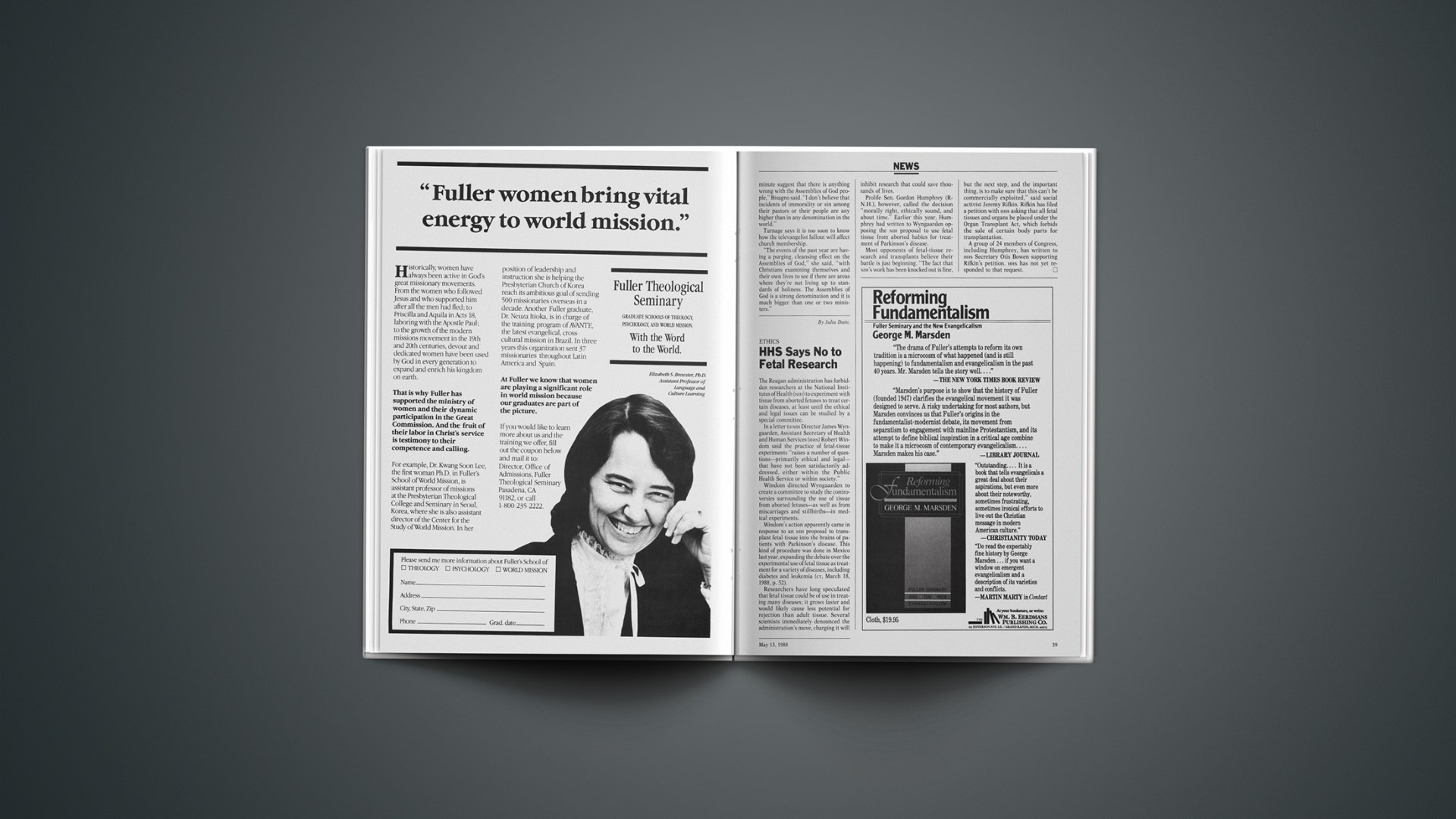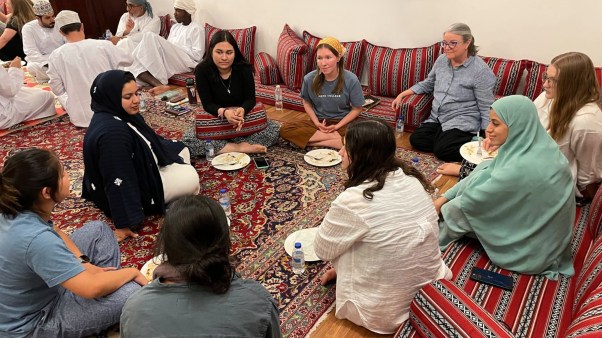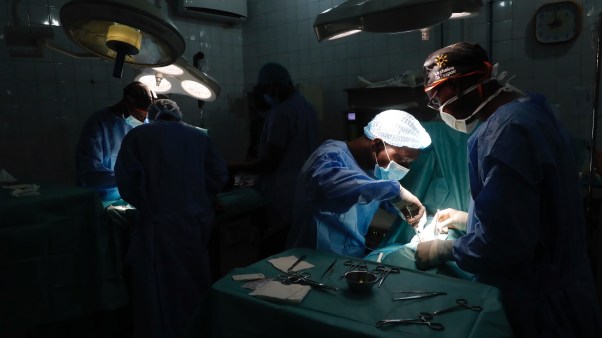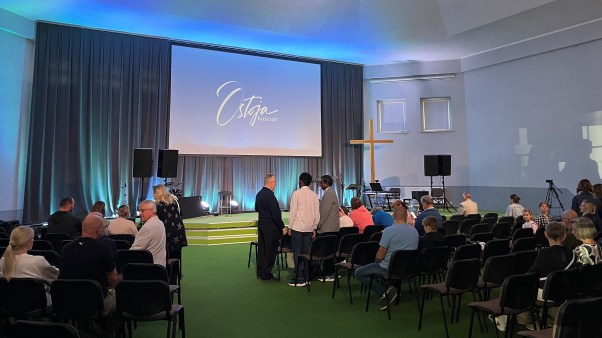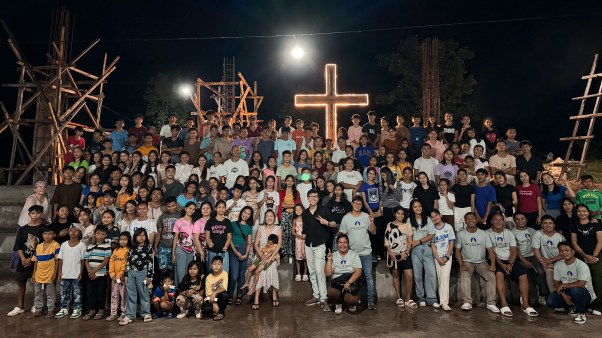ETHICS
The Reagan administration has forbidden researchers at the National Institutes of Health (NIH) to experiment with tissue from aborted fetuses to treat certain diseases, at least until the ethical and legal issues can be studied by a special committee.
In a letter to NIH Director James Wyngaarden, Assistant Secretary of Health and Human Services (HHS) Robert Windom said the practice of fetal-tissue experiments “raises a number of questions—primarily ethical and legal—that have not been satisfactorily addressed, either within the Public Health Service or within society.”
Windom directed Wyngaarden to create a committee to study the controversies surrounding the use of tissue from aborted fetuses—as well as from miscarriages and stillbirths—in medical experiments.
Windom’s action apparently came in response to an NIH proposal to transplant fetal tissue into the brains of patients with Parkinson’s disease. This kind of procedure was done in Mexico last year, expanding the debate over the experimental use of fetal tissue as treatment for a variety of diseases, including diabetes and leukemia (CT, March 18, 1988, p. 52).
Researchers have long speculated that fetal tissue could be of use in treating many diseases; it grows faster and would likely cause less potential for rejection than adult tissue. Several scientists immediately denounced the administration’s move, charging it will inhibit research that could save thousands of lives.
Prolife Sen. Gordon Humphrey (R-N.H.), however, called the decision “morally right, ethically sound, and about time.” Earlier this year, Humphrey had written to Wyngaarden opposing the NIH proposal to use fetal tissue from aborted babies for treatment of Parkinson’s disease.
Most opponents of fetal-tissue research and transplants believe their battle is just beginning. “The fact that NIH’S work has been knocked out is fine, but the next step, and the important thing, is to make sure that this can’t be commercially exploited,” said social activist Jeremy Rifkin. Rifkin has filed a petition with HHS asking that all fetal tissues and organs be placed under the Organ Transplant Act, which forbids the sale of certain body parts for transplantation.
A group of 24 members of Congress, including Humphrey, has written to HHS Secretary Otis Bowen supporting Rifkin’s petition, HHS has not yet responded to that request.
North American Scene
POLITICS
Falwell: “Free Ollie”
Jerry Falwell has launched a national petition drive to see Marine Lt. Col. Oliver North pardoned for his role in the Iran-contra affair.
North, former National Security Adviser John Poindexter, former Air Force Major Gen. Richard Secord, and businessman Albert Hakim were indicted on criminal charges that included conspiracy, fraud, and theft.
Falwell has urged voting-age viewers of his “Old-Time Gospel Hour” television program to become part of the drive; his goal is five million participants. A toll-free telephone number allows viewers to call in to give permission for their names to be included on the petition. Falwell said President Reagan will receive the petitions, which call for “an immediate and unconditional pardon” for North. “[North] is a true national hero who has put his life on the line over and over again,” Falwell said.
CHURCH AND STATE
Religious Liberty Debated
A vigorous debate about the First Amendment, religious liberty, and the role of religion in American public life was the subject of a national symposium last month at the University of Virginia. Nearly 100 participants with widely diverging views on the relationship between religion and government discussed applications of the religion clauses of the Constitution.
Representatives of Protestant, Catholic, Jewish, and humanist groups, public-policy organizations, and the academic world participated in the discussions. Program chairman James Davison Hunter, from the University of Virginia, said the conference was “successful,” not because any minds were changed, but because people with different—and often adversarial—points of view came together, listened, and left with a better understanding of one another.
The symposium was a project of the Williamsburg Charter Foundation, a nonprofit, nonsectarian group concerned with the religion clauses of the First Amendment. Next month, the foundation, which is recognized by the Commission on the Bicentennial of the U.S. Constitution, will sponsor a “celebration summit” in Williamsburg at which American dignitaries will sign a document reaffirming “freedom of conscience for people of all faiths and no faiths” (CT, March 4, 1988).
BUSINESS
Cigarette Maker Fights Back
RJR Nabisco Inc., a major producer of tobacco products, has fired its advertising agency, Saatchi & Saatchi DFS Compton, apparently as a result of the agency’s no-smoking commercial for Northwest Airlines. Industry observers estimate the agency will lose $70 million to $80 million in annual billings to RJR Nabisco.
Last month, Northwest Airlines banned smoking on all domestic flights (CT, April 22, 1988, p. 40). It aired a television commercial prepared by Saatchi & Saatchi DFS Compton featuring passengers applauding the airline’s decision to become smoke free.
PUBLISHING
Word Spreads
The Christian book and record publishing giant Word, Inc., has decided to move about one-third of its employees, including most of its top executives and its world headquarters, from the small, central Texas city of Waco to the Dallas-Fort Worth Metroplex.
Company executives said they wanted to be closer to the far-reaching Dallas-Fort Worth International Airport. They also said they wanted to take advantage of the burgeoning job market in the Metroplex and to have easier access to the area’s rapidly improving printing and record manufacturing systems. “We felt we needed to leave Waco if we were to continue to grow over the next five to ten years,” said Word president Gary Ingersoll.
Word accounts for between 15 and 20 percent of the market share of Christian books and audio and video cassettes. It accounts for some 60 percent of the market share of record and music products sold through Christian bookstores.
PEOPLE AND EVENTS
Briefly Noted
Ousted: By elders at the Community Chapel and Bible Training Center in suburban Seattle, Donald Barnett, the church’s controversial pastor (CT, Aug. 8, 1986, p. 32). Barnett was voted out for alleged repeated sexual contact with female church members. A court, however, restored his control of the congregation. In late March, elders countered by petitioning the King County Superior Court in Washington to dissolve their corporation.
Named: As the first black Catholic archbishop in the United States, Eugene Antonio Marino, the new archbishop of the Roman Catholic Archdiocese of Atlanta.
As the new president of African Enterprise (AE,) David Montague, who has spent more than a decade as a missionary to Africa, including a period among Kenya’s Massai people, AE is an interdenominational ministry with field offices in seven African nations. Montague will head AE’S U.S. office, located in Pasadena.
As president of Dallas Baptist University, Gary Cook, formerly an administrator at Baylor University in Waco, Texas. He replaces W. Marvin Watson, a former U.S. postmaster general, who resigned last fall.
Appointed: As the first executive director of the lay renewal group Presbyterians for Democracy and Religious Freedom (PDRF,) scholar-clergyman Paul Scotchmer, most recently an adviser to the Seattle-based World Without War Council. Since PDRF was recognized by the Presbyterian Church (USA) in June of 1986, its list of members and supporters has grown from 200 to over 4,000.

